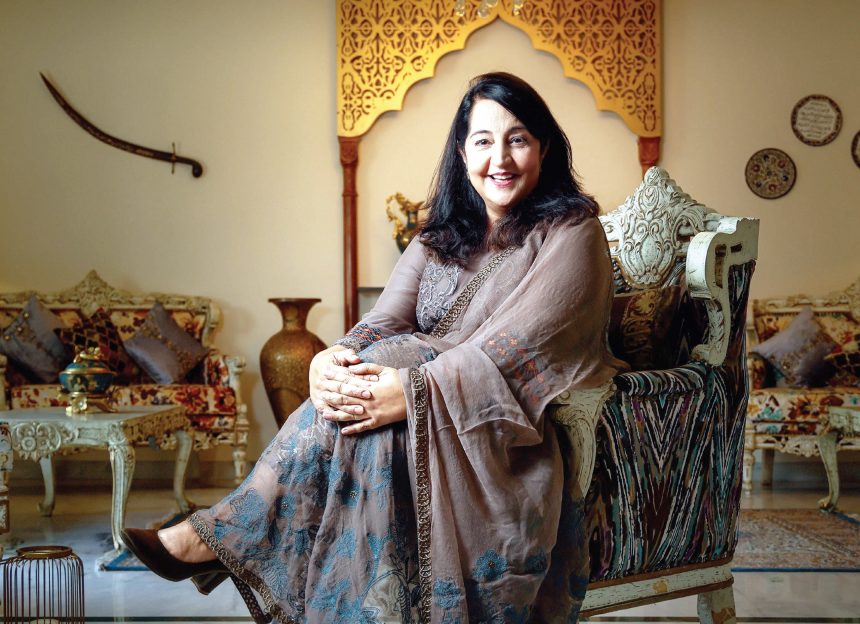Srinagar: Every year on March 8, International Women’s Day is celebrated across the globe, honouring the achievements of women and highlighting their contributions to society. This year, as we embrace the theme of “Accelerate Action”, it is crucial to spotlight women who have overcome immense challenges to drive transformation. One such story is that of Dilafrose Qazi, the Founder and Chairperson of SSM College of Engineering & Technology and Management. She established Kashmir’s first private engineering college, opening doors for countless students to pursue technical education.
In the late 1980s, as Kashmir was gripped by political turmoil and militancy, education suffered immensely. Schools and colleges were shut down or destroyed, and women’s access to education became increasingly restricted. Amidst this chaos, Dilafrose Qazi, born into a modest family in Baramulla, dared to dream of a better future.
Coming from a background where education was not a priority, Dilafrose’s journey was anything but easy. Her father, a leather garment maker, and her mother, who wove pashmina shawls, both struggled to make ends meet. Despite these hardships, her mother remained determined to educate her children. Dilafrose went on to earn a Master’s in Education and a Law degree from Kashmir University. However, unable to secure a government job, she decided to forge her own path.
“I wanted to be a government teacher for safety and survival, but since that was difficult to achieve, I started my own venture without wasting time,” Qazi recalls.
In 1988, she began her journey from a rented house in Srinagar’s Rajbagh area. Using Rs 25,000—money her father had saved for her wedding—she started offering hobby classes for women. This small initiative soon grew into the Srinagar School of Management, a vocational training center offering short-term courses in tailoring, cooking, stitching, and shorthand. Her mission was clear: to empower women through education and self-reliance.
Despite these struggles, she remained resolute. By 1994, she moved to a safer location, acquired land in Baramulla, and methodically expanded her initiative. With AICTE’s approval, her vocational center evolved into a polytechnic institute on the outskirts of Srinagar. In 1996, she took another bold step—establishing Kashmir’s first private engineering college, the SSM College of Engineering and Technology. This provided an alternative for students who would have otherwise been forced to leave the state for technical education.
Setting up a private engineering college in Kashmir was an unprecedented move, and as a woman, the challenges were even greater. Regulatory hurdles, financial constraints, and societal skepticism made her journey daunting.
“The biggest challenge was the social and political resistance. I faced hurdles at every step, from militants to bureaucratic roadblocks. The regulatory and social environment was not favorable, but despite that, there were many good people who supported my vision of creating a world-class private sector engineering college in Kashmir,” she reflects.
Today, SSM College offers degrees in civil, mechanical, electrical, and computer engineering, as well as business management courses. It has also expanded to Haryana, accommodating students from outside the region.
“SSM College has played a huge role in technical education in Jammu and Kashmir. It has given the region some of its best engineers and entrepreneurs. Nearly 50% of our students are women,” Qazi proudly states.
Beyond academics, Qazi has dedicated herself to rehabilitating families affected by militancy. She has set up embroidery centers, dairy farms, and vocational training institutes, equipping women with the skills to achieve financial independence.
“Many of these women are rape victims. They are now financially independent,” she says.
Over the years, her work has gained national and international recognition. In 2021, she was among 91 Indian nominees for the Nobel Peace Prize, a testament to her resilience and commitment to education in conflict-ridden Kashmir.
While her story is extraordinary, it also reflects the broader struggles women face in entrepreneurship and education. Social biases, bureaucratic hurdles, and security concerns remain significant barriers for Kashmiri women who aspire to break traditional roles and lead.










